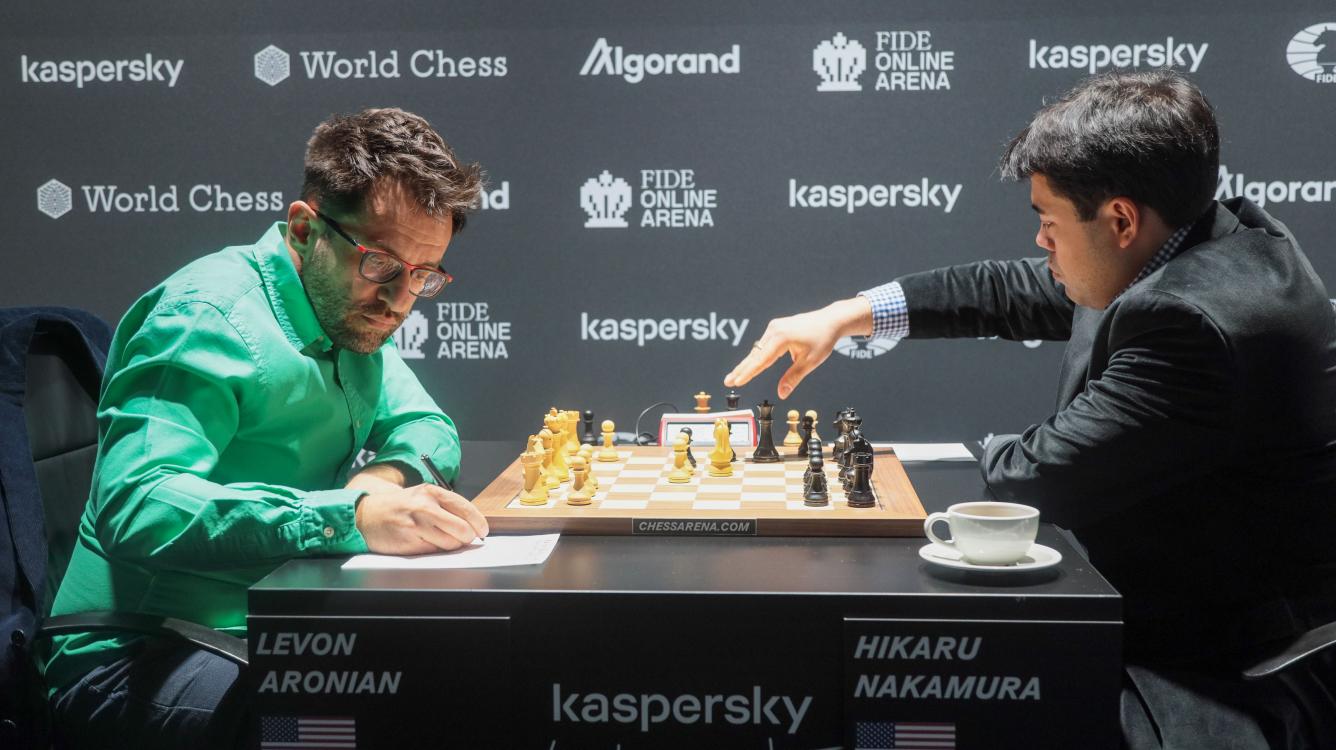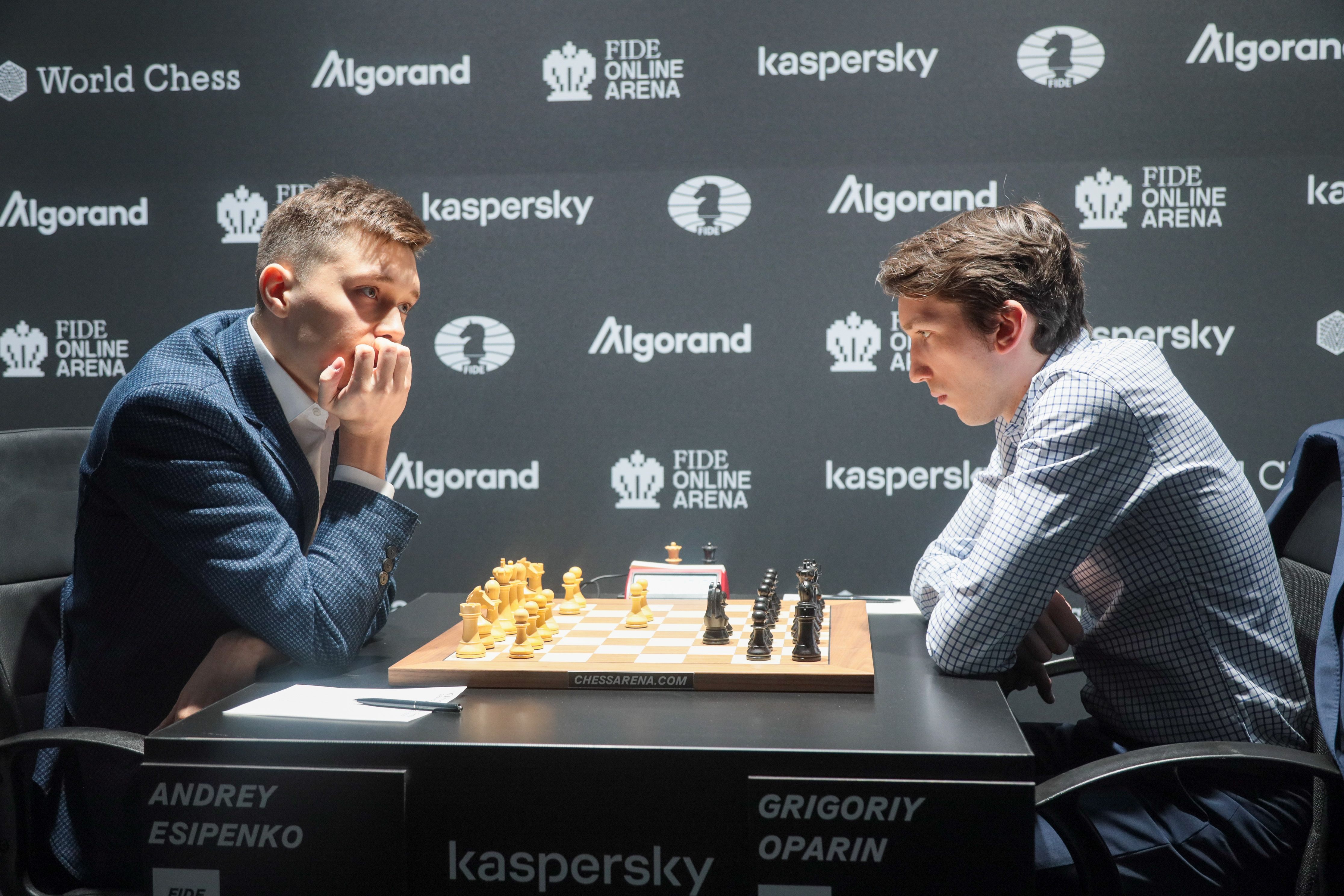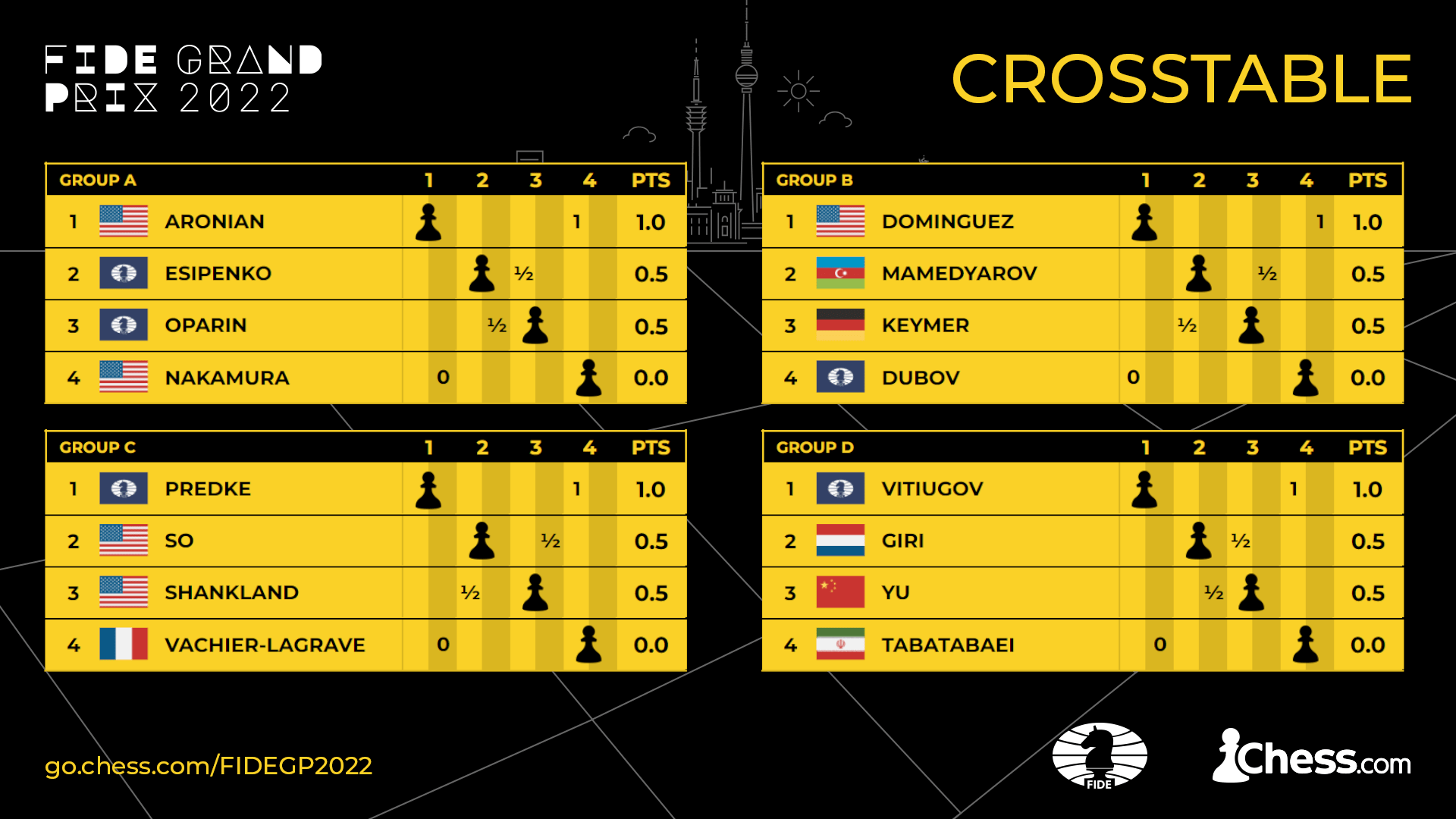
2022 FIDE Grand Prix Berlin Leg 3, R1: 4 Wins, Fighting Chess
The first round of the final leg of the 2022 FIDE Grand Prix saw four decisive games. Each group has a clear leader, with GMs Levon Aronian, Leinier Dominguez Perez, Alexandr Predke, and Nikita Vitiugov all leading their respective groups.
Round two begins on Wednesday, March 23, at 7 a.m. Pacific /15:00 Central European.
You can follow the games of the 2022 FIDE Grand Prix on our Events page. Chess.com is providing daily commentary on Chess.com/TV, Twitch, and YouTube. Find all of Chess.com's live broadcasts at Youtube.com/ChesscomLive.
The third and last leg of the FIDE Grand Prix that decides two, maybe three, of the spots in this summer's Candidates Tournament in Madrid, started with a bang and lots of fighting chess.
Each group saw one decisive game, which means that Aronian has taken the lead in Group A by winning a long game against GM Hikaru Nakamura, Dominguez leads Group B after defeating GM Daniil Dubov in a fascinating struggle, Predke is the surprising leader of Group C after winning a short game against GM Maxime Vachier-Lagrave, while the Russian Vitiugov is off to the best start in Group D after converting a long endgame against GM Amin Tabatabaei.
Group A
After two long games, one exciting and decisive, the other more technical and not decisive, Levon Aronian has taken the early lead in Group A.
Ahead of the event, Group A had been labeled the "Pool of Death," featuring three of the four finalists from the two previous legs of the Grand Prix: the two finalists from leg one, Nakamura and Aronian, and the losing finalist from the second leg, GM Dmitry Andreikin. However, already before the play of the first round commenced, Andreikin had to withdraw for personal reasons. The replacement was GM Andrei Esipenko, who came close to eliminating Nakamura from the pool play in the first leg—thus proving himself a dangerous addition to this tough pool.

All eyes were on the game between the two leg-one finalists, who had the pleasure of meeting each other in their first game here. Clearly, both showed up well-prepared. Nakamura chose to play a line in the Queen's Gambit Accepted that he had not used since 2015 but that fellow American Dominguez had used against Aronian in their semifinal match, a game that Aronian won. Both players blitzed out the thirteen moves and then Aronian varied with 14.Qd2 which, objectively, is not better than the 14.f3 he played against Dominguez, but it served the purpose of taking Nakamura out of his preparation.
That being said, it still looked like Black had the opportunity to equalize. However, in such a sharp line, even minor mistakes can radically change the evaluation, and that's exactly what happened; some less-than-accurate moves by Nakamura were met by precise play from Aronian, which tipped the evaluation bar in White's favor. After twenty-four moves, Aronian had barely used any of his time, having more than an hour and twenty minutes on the clock, whereas Nakamura was down to twelve minutes on the clock and something that looked like a lost position on the board. In fact, after the game, Nakamura revealed that he thought about resigning the game at that point.
Nevertheless, Nakamura showed his fighting abilities by forcing Aronian into an endgame with rook and two pawns vs knight & bishop, where Aronian needed to show some serious technique to convert his advantage. An impressive battle.

In the all-Russian encounter, Andrei Esipenko played the white pieces against Grigoriy Oparin. White opted for the versatile Catalan Opening where White claimed the tiniest of edges, but despite attempts to make something out of it, nothing concrete seemed to emerge on the board. That, however, did not stop Esipenko from trying to make the most of it. In the end, with bishop pair vs. bishop and knight, and four pawns to each side, the Benjamin of the field, Esipenko, had to accept that a draw was all that there was to be had.

Group B
In this fascinating group, which probably is my favorite group due to its diversity of players in terms of style, strength, age, and background, we also saw just one victory; Dominguez won a critical game as Black against Dubov to take the driver's seat.
In the first leg of the Grand Prix, Dominguez made it to the semifinal, and therefore a good result in this event could put him in an excellent position to claim a spot in the Candidates, particularly now that GM Sergey Karjakin's spot is open as well.
In today's round, he faced Daniil Dubov with the black pieces, and he chose the Karpov Variation of the Nimzo-Indian Defense, which is a heavily analyzed line, but with mutual effort, the two players soon went down less-explored paths. After sharp but sloppy play from Dubov in the early middlegame, Dominguez took control of the game and started outplaying his Russian opponent. In a Hail Mary attempt for counterplay, Dubov got rewarded when the American grandmaster failed to find the best continuation. However, the flow soon changed again after further mistakes by Dubov, only to see Black throw almost all of it away in his time trouble.

But justice found its way to the board, finding truth in the saying by Tartakower: "The winner is the player who makes the next-to-last mistake." Dubov erred again, once more after playing too fast with plenty of time on the clock, allowing Dominguez to enter an easily won rook ending that was converted with iron precision.
In the second game, German GM Vincent Keymer, who just finished his exams last week, faced former world number-two, GM Shakhriyar Mamedyarov, with the white pieces. Keymer chose a line in the English Opening that he has played dozens of times, so that could not have been a surprise for the Azeri grandmaster who played a new idea on move nine. The move seemed to more or less equalize, and soon after, the players started exchanging pieces into a pure bishop and pawn endgame where White had a marginal edge. Mamedyarov, to his credit, held the draw effortlessly.
Group C
The lone victor in Group C in today's round was Alexandr Predke who, therefore, has taken a surprise lead.
If Pool A is the Pool of Death, then we can call this one "Predke & The Heartbroken", insofar that three of the players had their hearts broken in the earlier Grand Prix events. In Belgrade, Vachier-Lagrave got eliminated by Richard Rapport after narrowly failing to convert a winning position in the second game of their semifinal. GM Sam Shankland was eliminated in the pool play in Belgrade when Andreikin pulled a rabbit out of the hat and won a lost position against GM Etienne Bacrot in their last-round encounter. Finally, GM Wesley So seemed to be cruising in the pool play of the first leg in Berlin but was caught by Leinier Dominguez, who then won their tiebreaker.
Like their compatriots in Group A, the two Americans faced each other in their first-round encounter, with Shankland playing the white pieces. In a 4.Qc2 Nimzo-Indian, something that Shankland had also used in Belgrade, the play appeared rather sharp at first, but very soon, the players started chopping wood down an endgame with a queen plus rook and six pawns to each side. With the pawns distributed symmetrically, it could look like a certain draw, but Shankland's control of the d-file guaranteed him a tiny edge.
So defended precisely, giving up a pawn to get the queens off the board in order to enter a drawn rook ending, which he, despite Shankland's best efforts, held effortlessly.
In the other encounter, Alexandr Predke faced Vachier-Lagrave with the white pieces and chose the English Opening. This choice was possibly inspired by the fact that Vachier-Lagrave, who likes to employ the Grunfeld Defense, has struggled when entering those anti-Grunfeld lines and never seemed comfortable when trying something different.
In this game, the French grandmaster went for the Symmetrical English Four Knights, which sounds boring but is, in fact, incredibly complex. This became even clearer when the players castled in opposite directions, with White sending the king to the queenside.

When White played 15.g4!, a move that thoroughly impressed commentator GM Robert Hess, it became clear that Black was already in trouble, as White's follow-up with h2-h4 opened the files on the kingside well before Black had finished developing his queenside pieces. After some more mistakes by Vachier-Lagrave, Predke won a crushing miniature. Certainly not the start that the French grandmaster had hoped for.
Group D
A couple of interesting fights turned out with results different from what they looked like halfway through today's round. But at the end of the play, Vitiugov stood as the sole winner, taking the early lead.
It is conventional wisdom, at least in today's world of top chess, that you should not repeat your opening lines in the same event. I do not know if that message had been sent via messenger pigeon or as a message in a bottle to GM Yu Yangyi, but clearly, the letter had not been received, as he repeated a line in the Petroff, 4...Nc6, that he had already used twice(!) in Belgrade (against Vachier-Lagrave and Predke, both games ended in draws). GM Anish Giri had only faced this line once previously, in an online game against Aronian last year, but it would be naive to think that he showed up unprepared against this line.

It was indeed Giri who uncorked the first new move of the game when he, on move 12, added an interesting twist to the line Yu had played against Predke. Giri got the initiative and after a few inaccurate moves by Black, the advantage grew bigger and bigger, making it look almost certain that Giri would collect his first win of the event.
However, his precise play had cost considerable time on the clock and when he was down to two minutes on the clock and more than 15 moves to go, the mistakes started sneaking up and the decisive advantage crumbled like a coffee cake that had been left unclaimed for too long on the tray. When the players agreed upon a draw after White's 32nd move, you could make an argument for Black having the upper hand, but apparently, Yu did not see the need to push that envelope in the first game.
In the second game of the group, the reigning Russian champion Vitiugov had the white pieces against the young Iranian Amin Tabatabaei, who had played strong, resourceful, and fighting chess in Belgrade. Against the Ruy Lopez, Tabatabaei chose the Open Variation, just like he and others had done in Belgrade.
Vitiugov seemed well-prepared, deviating from lines he had previously played against the Open Variation and securing a tiny plus, which he carefully nurtured to grow bigger, only really slipping once, on move 30, and then converting a pawn-up rook ending without much hesitation. A very convincing victory.

Results

All Games - Round 1
FIDE Grand Prix Berlin is the final leg of the 2022 Grand Prix. The Berlin tournament takes place March 22-April 4. Tune in at 7 a.m. Pacific/15:00 CET each day for our broadcast.
Previous Coverage:


